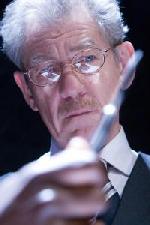SEARCH
REVIEWS
FEATURES
NEWS
Etcetera and
Short Term Listings
LISTINGS
Broadway
Off-Broadway
NYC Restaurants
BOOKS and CDs
OTHER PLACES
Berkshires
London
California
DC
Philadelphia
Elsewhere
QUOTES
On TKTS
PLAYWRIGHTS' ALBUMS
LETTERS TO EDITOR
FILM
LINKS
MISCELLANEOUS
Free Updates
Masthead
Writing for Us
A CurtainUp  London Review
London Review
 London Review
London ReviewThe Cut
by Neil Dowden
|
Paul: At the end of the day, I'm a good man
Stephen: You're evil. |

Ian McKellen as Paul
(Photo: Robert Workman) |
Paul (Ian McKellen) is a grey-suited civil servant, who meticulously follows the bureaucratic regulations of his department, with a deskful of directives. When John (Jimmy Akingbola) comes to his office he wants to know if he has any complaint about 'unnecessary brutality' and is keen to let him know all the options open to him. But John wants only the ritual known as "the Cut", a half-surgical, half-torturous operation similar to a lobotomy, which Paul reluctantly gives him.
Paul is consumed with guilt about his job, which he has kept dark from his family. When we see him at home with his wife Susan (Deborah Findlay) he is sympathetic to her petty anxieties about the incompetence of their servant but her domestic neuroses are evidently a symptom of her unease of knowing that her husband is not open with her, and she has refused to have sex with him for six months. They are united only in their love for their student son Stephen (Tom Burke) who is campaigning for a more liberal regime.
Ravenhill is deliberately non-specific about the nature of the totalitarian government in place but its repressive nature is clear. Prisons are full of political subversives, universities peddle propaganda and the Cut is used either to prevent or punish rebellion in an underclass. He seems to be suggesting that one regime may be toppled by another regime with more idealistic policies but that once they gain power then their prime concern is to keep that power regardless of human rights.
In fact, The Cut is at its strongest in suggesting that the corrupting consequences of abusing power will have a knock-on effect on every part of your life, and on those around you. Paul is a loving husband and father but he cannot separate his shameful occupation from his home life. Although not as linguistically inventive as Pinter's Ashes to Ashes or as viscerally shocking as Kane's Cleansed, the play powerfully shows the dehumanizing effects of a repressive regime on both the oppressed and the oppressors.
Paul Wills' design is particularly effective in evoking the clinically sinister office of the Cut, with its operating table and viewless windows. Paule Constable's stark lighting and Adam Cork's chilling music and sound score both add significantly to the forbidding atmosphere.
Michael Grandage's faultless direction elicits pitch-perfect performances. As Paul, McKellen - fresh from playing Widow Twankey in the Aladdin panto at the Old Vic! - gives a masterclass in acting, moving seamlessly from buttoned-up bureaucrat and self-loathing torturer, to solicitous husband and proud father. Deborah Findlay is also impressive as the tranquilizer-popping Susan, her rigid body belying her social poise to suggest a deep-seated anxiety. Jimmy Akingbola's John is shockingly single-minded in his bid for self-annihilation, while there is something disturbingly dispassionate about the way Tom Burke's seemingly enlightened John denounces his father as 'evil'. Will the new generation turn out to be any better than the old one, we wonder?
| THE CUT
Written by Mark Ravenhill Directed by Michael Grandage Starring Ian McKellen, Deborah Findlay, Jimmy Akingbola With: Tom Burke, Bindu de Stoppani, Emma Beattie Designer: Paul Wills Lighting: Paule Constable Sound: Adam Cork A Donmar Warehouse production Running time: 1 hour 30 minutes with no interval Box Office: 0870 060 6624 Booking to 1st April 2006 Reviewed by Neil Dowden based on 4th March 2006 performance at the Donmar Warehouse, 41 Earlham Street, London WC2 (Underground: Covent Garden) |





